Click Softly presents Top Business Software Types And Comparison Best Guide 2025 — explore the key categories of business software, compare top solutions, and find the best fit for your company’s needs. Stay ahead with expert insights for 2025.
Are you feeling overwhelmed by the sheer number of business software options available today? You’re not alone.
Choosing the right tools is crucial for boosting your productivity and efficiency. But with so many types and features to consider, how do you know what’s best for your business?
This guide breaks down the most common types of business software, comparing their features, benefits, and drawbacks.
Whether you need help with project management, accounting, or customer relations, understanding these options can save you time and money.
By the end of this article, you’ll be equipped with the knowledge to make an informed decision tailored to your specific needs. Dive in and discover how the right software can transform your business operations!
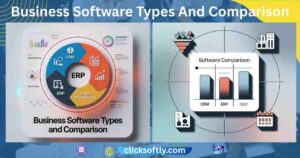
Enterprise Resource Planning (erp)
Enterprise Resource Planning (ERP) systems are vital in modern businesses. They integrate various business functions into a single system. This helps in streamlining processes and information across the organization. ERP solutions provide a centralized database. This ensures data consistency and accuracy.
Business Software Types And Comparison, Core Functions
ERP systems cover key business areas. These include finance, human resources, and supply chain management. They also support sales and customer service operations.
ERP systems offer modules for each function. This allows businesses to choose what fits their needs. These modules work together to provide a unified view of business operations.
Benefits And Limitations
ERP systems offer numerous benefits. They improve efficiency by automating repetitive tasks. They enhance decision-making with real-time data insights.
ERP systems also promote collaboration across departments. However, they have limitations. Implementation can be costly and time-consuming. Some businesses face challenges in adapting to new systems.
Popular Erp Solutions
Several ERP solutions dominate the market. SAP is known for its comprehensive features. Oracle offers robust database management and analytics.
Microsoft Dynamics is user-friendly and integrates well with other Microsoft products. Each solution caters to different business sizes and needs. Choosing the right ERP depends on specific business requirements.
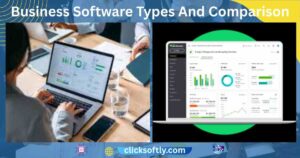
Customer Relationship Management (crm)
Customer Relationship Management (CRM) software helps businesses manage interactions with customers. It organizes data, tracks sales, and enhances communication.
Businesses use CRM to improve customer service and increase sales. CRM systems offer tools to maintain client relationships efficiently. These tools lead to better customer retention and satisfaction.
Key Features
CRM systems provide contact management for organizing customer information. They offer sales tracking to monitor leads and deals. Integration capabilities allow CRM to work with other business tools.
Automation features save time by handling repetitive tasks. Reporting tools generate insights from customer data. Mobile access ensures CRM can be used anywhere.
Business Software Types And Comparison, Advantages For Businesses
CRM systems streamline customer interactions. They improve communication between teams. Businesses gain valuable insights from CRM data. These insights help in making informed decisions. CRM enhances customer service by tracking issues. It boosts customer satisfaction and loyalty. Sales teams close deals faster with CRM tools.
Top Crm Platforms
Salesforce is widely used for its customization options. HubSpot CRM offers a free version with essential features. Zoho CRM is affordable and easy to use. Microsoft Dynamics 365 integrates well with other Microsoft products. Pipedrive is known for its intuitive interface. Each platform caters to different business needs.
Human Resource Management Systems (hrms)
Human Resource Management Systems (HRMS) offer essential tools for businesses to manage employee records efficiently.
Comparing different software types reveals varied features like payroll processing, recruitment automation, and performance tracking. Selecting the right HRMS streamlines operations and enhances workforce management.
In today’s fast-paced business world, Human Resource Management Systems (HRMS) have become indispensable. They streamline HR processes and automate administrative tasks, freeing HR teams to focus on strategic goals. But what makes these systems so vital, and how can they benefit your organization?
Business Software Types And Comparison, Essential Components
HRMS software typically includes several key components. Employee data management is crucial; it stores personal details, job roles, and performance metrics.
Payroll processing automates salary calculations, tax deductions, and benefits. Recruitment management helps in tracking applications and scheduling interviews. These features ensure that your HR team can manage their workload efficiently, reducing errors and saving time.
Benefits For Hr Teams
Imagine spending hours manually entering data or tracking leave days. HRMS eliminates these tedious tasks. It allows HR teams to focus on people, not paperwork. The system enhances productivity by automating routine tasks.
It also provides valuable insights through analytics, helping you make data-driven decisions. Have you ever wondered how much time could be saved with automation? HRMS answers that question with efficiency.
Business Software Types And Comparison, Leading Hrms Software
Several HRMS software options stand out in the market. Workday offers comprehensive solutions with a focus on global compliance. BambooHR is ideal for small to medium-sized businesses, known for its user-friendly interface. ADP Workforce Now provides robust payroll and HR management for larger enterprises.
Choosing the right HRMS depends on your organization’s specific needs and size. If you’ve ever experienced the stress of managing HR tasks manually, an HRMS could be your solution. By adopting the right system, your HR team can work smarter, not harder. What will you do with the extra time saved?
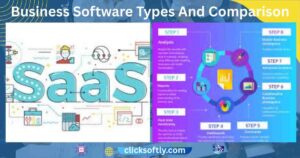
Project Management Software
In today’s fast-paced business environment, keeping track of projects can be overwhelming. Project management software is here to simplify that task, providing tools that help teams plan, execute, and manage projects efficiently.
Whether you’re working with a small team or coordinating a large-scale enterprise, these tools can be game changers.
Key Capabilities
Project management software comes with a variety of capabilities designed to streamline your workflow. Task assignment and tracking are central features. They ensure everyone knows what they’re supposed to be doing and when.
These platforms often include calendars and scheduling tools to help you visualize project timelines. This can prevent bottlenecks and ensure deadlines are met without stress.
Communication is another crucial feature. Integrated messaging and file-sharing capabilities keep everyone on the same page and reduce email overload.
Impact On Team Efficiency
Have you ever noticed how projects tend to slow down when communication gets muddled? Project management software can significantly improve team efficiency by clarifying tasks and deadlines.
Imagine a tool that allows your team to see all tasks in one place. This transparency can boost accountability and motivation, leading to faster project completion.
Improved efficiency also comes from reduced duplication of efforts. When everyone knows their role and responsibilities, work is streamlined, and productivity increases.
Popular Project Management Tools
There are several popular tools out there, each with its unique strengths. Ever heard of Trello? It’s a favorite for its user-friendly interface and card-based system, ideal for visual thinkers.
Asana is another top contender, praised for its robust task management capabilities. It even offers automation features to eliminate repetitive tasks.
For larger projects, Microsoft Project provides advanced project planning and resource management capabilities. It’s perfect for teams that need detailed project analysis.
Choosing the right tool depends on your team’s needs and project complexity. Have you tried any of these tools, or is there another favorite you’d recommend? Your insights could help others find the perfect fit.
Accounting Software
When managing a business, keeping your finances in check is crucial. Accounting software plays a vital role in simplifying this complex task. It helps you maintain accurate financial records, track expenses, and generate insightful reports.
Whether you are running a small startup or a large enterprise, the right accounting software can make a significant difference in your business’s financial health.
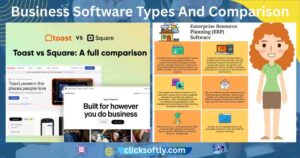
Core Accounting Features
Every accounting software should come with some essential features. Look for tools that allow you to manage invoices, track expenses, and handle payroll efficiently. Bank reconciliation is another critical feature, ensuring your financial records match your bank statements.
Consider software that offers real-time financial reporting. This feature helps you understand your company’s financial position at any given moment. User-friendly interfaces and customizable dashboards can make navigation easier, saving you time and effort.
Benefits For Financial Management
Good accounting software enhances your financial management. It reduces human error, providing more accurate data for decision-making. Automation capabilities allow for faster processing of transactions, freeing up your time for more strategic tasks.
Having everything in one place improves organization. It ensures compliance with tax regulations, reducing the risk of audits and penalties. You can also gain valuable insights into spending patterns, helping you make informed budgeting decisions.
Top Accounting Software Options
Choosing the right accounting software is crucial. QuickBooks is a popular choice for small to medium businesses, offering a range of features at affordable prices. Its user-friendly interface makes it accessible even to those without an accounting background.
For larger businesses, SAP Business One provides comprehensive solutions tailored to complex financial needs. If you prioritize cloud-based solutions, consider Xero, known for its robust online capabilities and integration with third-party apps.
Do you have specific requirements, like industry-specific needs? FreshBooks and Zoho Books offer customizable options, catering to niche markets. Remember, the best software for you depends on your business size, industry, and specific needs.
Have you ever thought about how better financial management could transform your business? Investing in the right accounting software might be the first step toward realizing that transformation.
Business Software Types And Comparison, Supply Chain Management Software
Supply Chain Management Software streamlines operations by tracking goods and managing inventory. Different types offer unique features for businesses, such as real-time tracking and automated reporting. Comparing options can help in selecting the best fit for your needs.
Supply Chain Management Software, or SCM, plays a key role in modern business. It helps companies manage the flow of goods, data, and finances. SCM software connects suppliers, manufacturers, and retailers.
This ensures products reach customers smoothly and efficiently. With digital transformation growing, SCM software becomes more essential.
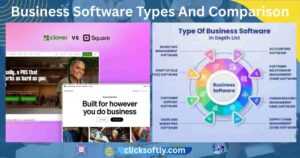
Critical Functions
SCM software performs several critical functions. It manages procurement, inventory, and order processing. It also handles logistics and supplier relationships. These functions streamline operations.
They reduce costs and improve service levels. Forecasting and demand planning are also vital functions. They help businesses prepare for market changes.
Enhancing Supply Chain Efficiency
SCM software enhances supply chain efficiency. It offers real-time data and insights. This helps in making informed decisions quickly. Automation of repetitive tasks saves time. It reduces human error and improves accuracy. Better communication among stakeholders is another benefit. This leads to faster problem-solving and collaboration.
Best Scm Solutions
Several SCM solutions stand out in the market. SAP SCM is a popular choice. It offers comprehensive features for large enterprises. Oracle SCM Cloud is another leading option. It provides flexibility and scalability.
For small to medium businesses, Infor SCM is ideal. It offers user-friendly tools and competitive pricing. Each solution caters to different business needs. Consider your company’s size and requirements when choosing.
Business Software Types And Comparison, Business Intelligence Tools
Business Intelligence (BI) tools help transform raw data into meaningful insights. Companies use these tools to make informed decisions. They offer various features to analyze and visualize data. Understanding these tools can greatly benefit any business.
Data Analysis Features
BI tools offer powerful data analysis features. They help users find trends and patterns in data. Many tools provide easy-to-use dashboards and reports. Users can customize these to meet specific needs. Some tools include predictive analytics to forecast future trends. This helps businesses plan effectively.
Driving Business Decisions
BI tools play a key role in driving business decisions. By analyzing data, they uncover valuable insights. These insights guide strategic planning and operational improvements. BI tools help identify market trends and customer preferences. This allows businesses to stay competitive and focused.
Popular Bi Tools
Several BI tools are popular in the market. Power BI is known for its user-friendly interface. It integrates well with other Microsoft products. Tableau offers strong data visualization capabilities.
It’s suitable for both small and large enterprises. Qlik Sense provides interactive analytics and flexible dashboards. It helps users understand complex data with ease. Each tool has unique strengths, catering to different business needs.
Business Software Types And Comparison, Collaboration Software
Discover the versatility of collaboration software as a vital tool in business. Compare types like project management and communication platforms. Each offers unique features to enhance teamwork and productivity.
Collaboration software plays a vital role in modern businesses. It helps teams work together efficiently. This software improves communication and streamlines workflows. It ensures everyone is on the same page. Businesses can achieve better results through effective collaboration. Let’s explore key aspects of collaboration software.
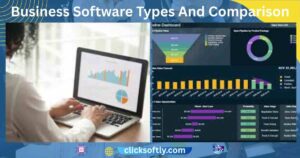
Communication And Workflow Features
Collaboration software offers a range of communication tools. These tools include chat, video calls, and file sharing. They enable seamless interaction among team members. Workflow features help organize tasks and projects.
They allow teams to track progress easily. Automation tools can reduce repetitive tasks. This saves time and boosts productivity.
Enhancing Team Collaboration
Collaboration software enhances teamwork by fostering transparency. It offers a central place for storing and sharing documents. This reduces the chances of miscommunication.
Teams can access information anytime, anywhere. This flexibility supports remote work and diverse teams. Real-time updates ensure everyone stays informed. The software promotes a culture of collaboration.
Leading Collaboration Platforms
Several platforms lead the way in collaboration software. Slack is known for its messaging and integration features. Microsoft Teams integrates well with Office 365 tools.
Asana focuses on project management and team organization. Trello uses boards for visual task management. These platforms offer unique features to suit different business needs.
Software Comparison Criteria
Choosing business software involves comparing types like CRM, ERP, and accounting tools. Consider features, ease of use, and cost. Evaluate customer support and integration capabilities to find the best fit.
When you’re choosing the right business software, it’s essential to compare options based on specific criteria that align with your business needs. This is where the Software Comparison Criteria come into play.
By focusing on key aspects like cost, scalability, and ease of use, you can make an informed decision that supports your business growth and efficiency.
Cost Considerations
Budget is often the first hurdle when evaluating business software. You need to assess not just the initial purchase price but also the long-term costs. Consider monthly or annual subscription fees, potential upgrade charges, and any hidden expenses like training or customer support.
Sometimes, seemingly cheap software can turn expensive over time due to frequent updates or additional features. Ask yourself: Is this software genuinely offering value for money?
Look for software that offers a free trial or a demo version. This allows you to test its features without a financial commitment.
Business Software Types And Comparison, Scalability Factors
Growth is a key goal for any business, and your software should support that. Scalability means the software can handle an increase in users or data without compromising performance. Picture this: you start with a small team, but what happens when your team doubles or triples?
Your software should be ready to scale up smoothly. Choose software that can grow with your business. Check if it offers different tiers or plans that allow for easy upgrades.
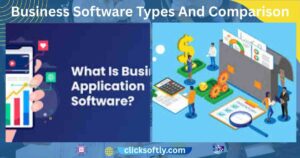
Ease Of Use And Integration
The best software is one that your team can use effortlessly. Complex software can lead to frustration and decreased productivity. It should have a user-friendly interface and straightforward navigation. Integration with existing systems is another vital consideration.
You shouldn’t need to overhaul your current setup to accommodate new software. It should blend seamlessly with your other tools, like email clients or CRM systems. Reflect on past experiences: Have you ever struggled with software that was too complicated?
Avoid repeating that mistake by prioritizing ease of use and integration. By focusing on these criteria, you can ensure that the business software you choose will be a valuable asset, rather than a costly mistake. So, what are your priorities when comparing software? Let these criteria guide your decision-making process.
Emerging Trends In Business Software
As the business landscape evolves, so does the software that supports it. Emerging trends in business software are reshaping how companies operate, communicate, and grow.
Understanding these trends can help you make informed decisions about which tools to adopt for your business. Below, we explore some key trends that are transforming the business software arena.
Artificial Intelligence Integration
Artificial Intelligence (AI) is no longer just a futuristic concept; it’s becoming a staple in business software. AI can enhance customer service through chatbots that provide instant responses to inquiries. It also improves data analysis, allowing you to make quicker, data-driven decisions.
Imagine software that predicts sales trends or automates repetitive tasks, freeing up your time for more strategic activities. How are you leveraging AI to stay ahead in your industry?
Business Software Types And Comparison, Cloud-based Solutions
Cloud-based software offers flexibility and scalability that traditional software cannot match. It enables you to access your business tools and data from anywhere, at any time. This is especially beneficial for businesses with remote teams or those looking to expand rapidly.
Consider how cloud solutions can reduce your IT costs and improve collaboration across departments. Are you ready to transition your operations to the cloud?
Business Software Types And Comparison, video!
Mobile Accessibility
With the increasing use of smartphones, mobile accessibility in business software is crucial. Mobile-friendly applications ensure that your team can work efficiently, even on the go. Whether it’s checking inventory, approving documents, or communicating with clients, mobile access keeps your business running smoothly.
Think about how mobile accessibility can enhance your team’s productivity. Are your business tools optimized for mobile use?
These emerging trends in business software highlight the need to stay current with technological advancements. As you consider these trends, think about how they align with your business goals and challenges. Embrace these changes and watch your business thrive in a digital-first world.
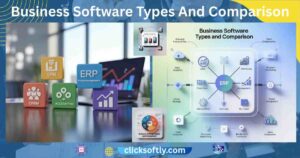
Frequently Asked Questions
What Are The 8 Common Types Of Software Applications?
The 8 common types of software applications are word processors, spreadsheets, presentation software, database management systems, web browsers, email clients, graphic design tools, and media players. These applications assist in various tasks like document creation, data analysis, browsing the internet, managing communications, designing visuals, and playing multimedia files.
Which Software Is Most Used In Business?
Microsoft Office Suite is widely used in business for tasks like document creation and data management. Businesses also rely on QuickBooks for accounting and Salesforce for customer relationship management. These tools enhance efficiency and streamline operations across various industries.
What Are The 3 Types Of Software And Describe The Purpose Of Software?
The three types of software are system software, application software, and middleware. Software enables computers to perform tasks efficiently, manage hardware resources, and provide user-friendly interfaces for executing specific functions.
What Are The 10 Examples Of Application Software?
Ten examples of application software are Microsoft Word, Adobe Photoshop, Google Chrome, Microsoft Excel, VLC Media Player, Skype, AutoCAD, QuickBooks, Zoom, and Spotify. These programs help users perform specific tasks like word processing, browsing, designing, video playing, communication, accounting, and streaming music.
Conclusion
Choosing the right business software is crucial for success. Each type offers unique benefits. Some boost productivity, while others enhance customer relations.
Consider your specific needs before deciding. Compare features, prices, and user reviews carefully. Don’t rush the decision. A well-chosen software can streamline operations and save money.
Always stay updated with software trends. This ensures your business remains competitive. By understanding different software types, you make informed choices. This leads to better efficiency and growth. Use this guide to navigate the software landscape effectively.
Your business deserves the best tools.


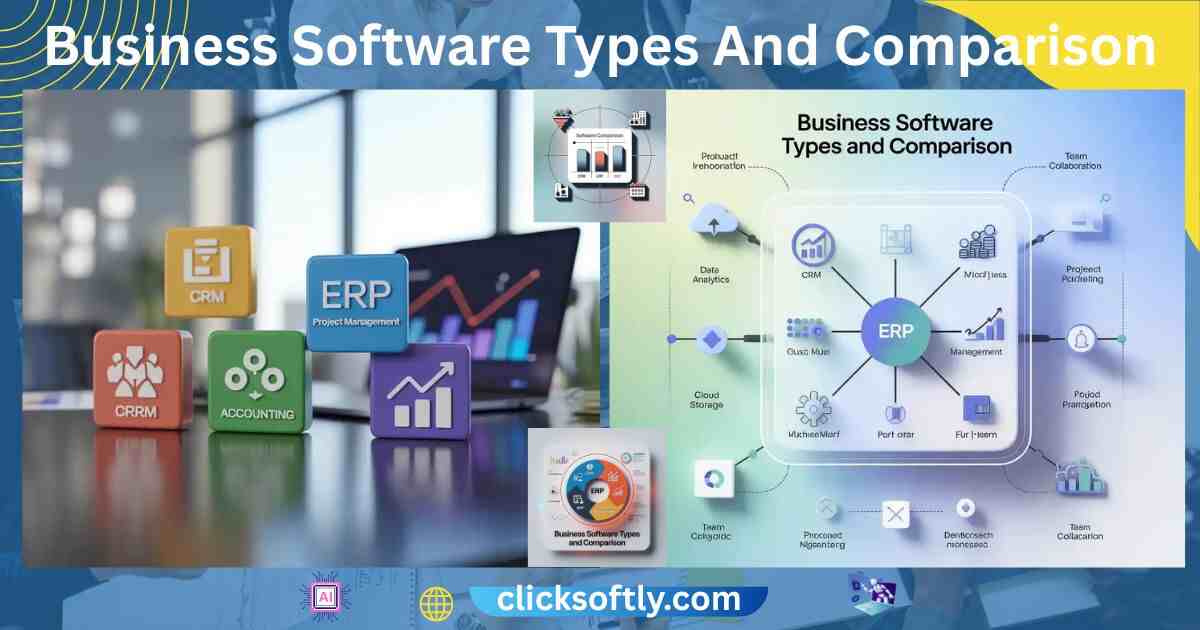
Leave a Reply